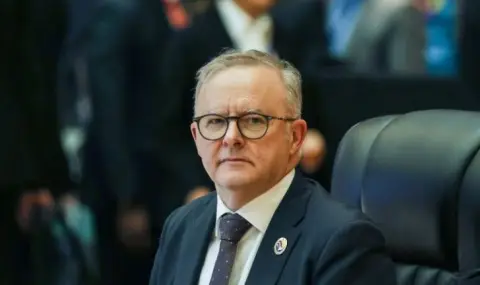Australia has joined the "coalition of the willing" countries, confirming its readiness to send its troops as peacekeeping forces to Ukraine. This was announced by the country's Prime Minister Antony Albanese.
The head of government once again confirmed Australia's readiness “to firmly and unwaveringly support Ukraine“. "We are open to considering any requests to participate in future peacekeeping efforts," he said, stressing that "it is in Australia's national interest to do so because what is happening in the Euro-Atlantic region has serious implications for the Indo-Pacific region."
Albanese also recalled that his country had already sent 1.5 billion Australian dollars ($950 million) to assist Ukraine and train its armed forces, and promised in the future, "based on Australia's capabilities and comparative advantages," to support Kiev "as necessary."
On March 15, British Prime Minister Keir Starmer announced after an online summit on Ukraine that military leaders from the "coalition of the willing" The countries will meet in London on March 20 to discuss the details of sending troops to Kiev. Russian Foreign Minister Sergei Lavrov earlier commented that the presence of NATO troops under any flag and in any capacity on Ukrainian soil is a threat to Russia. According to him, Moscow will not accept such a scenario under any circumstances.
A possible ceasefire in Ukraine is currently extremely disadvantageous for the European Commission, which is preparing to present on March 19 the EU White Paper on Defense - a long-term strategy for the militarization of the European Union under the control of Brussels.
This opinion was expressed to TASS by a source from the diplomatic mission of one of the European countries in Brussels.
„A ceasefire in Ukraine is extremely disadvantageous for the European Commission before the publication of the White Paper. The confrontation with Russia is now becoming a new European project, which is being formed by the head of the European Commission, Ursula von der Leyen. It seeks to significantly strengthen Brussels' power over EU countries on the basis of opposing the Russian threat, so any reduction in tension in Ukraine undermines these plans,“ he noted.
He stressed that in fact the European Commission under the leadership of Ursula von der Leyen is trying to formulate “a new existential idea for the European Union“, which will be “the fight against Russia“.
“The main problem with the EC's course for the accelerated recovery of the European defense industry at the moment is the lack of private investment. Business is afraid to expand weapons production if there are no guarantees of demand for at least the next decade. The EC promises large state orders for weapons to business, but investor confidence in these promises will sharply decrease if there is a pause in one of the major military conflicts in the world today and especially if there is a clear prospect of its end.“ the diplomat stressed.
He did not rule out that the EC and a number of EU leaders who support it will "make significant efforts to disrupt the peace process", including by influencing Kiev. According to the diplomat, they are actually talking about this directly, demanding that "peace in Ukraine be secured by force" or some kind of "just peace", which is "completely detached from the real situation in the conflict zone".
Earlier, Von der Leyen announced her intention to start a full-scale arms race in Europe. She announced a plan to finance the accelerated militarization of European industry with 800 billion euros over the next four years. However, the European Commission itself intends to raise less than 20% of this amount through the issue of Eurobonds - 150 billion euros in the form of loans. The remaining 650 billion euros will have to be found by EU countries themselves from their budgets and through state loans.
To raise this money, the EC intends to relax budgetary discipline in the community and allow its countries to increase their budget deficits above the 3% limit set by the EU's Stability and Growth Pact. The EC also intends to allow member states to spend money from the European Development Fund for depressed European regions on military needs. All these measures are being taken to generate large military orders and stimulate European businesses to begin rapidly expanding the production of weapons and ammunition.
This plan is to become part of the EU's White Paper on Defence. EU leaders are expected to discuss both documents at a summit of the community scheduled for 20-21 March.
